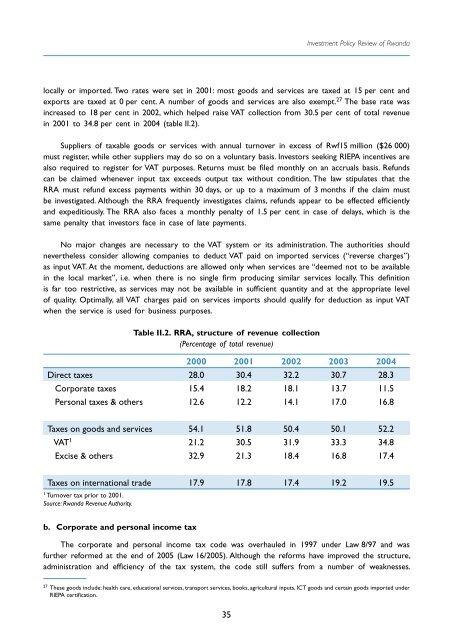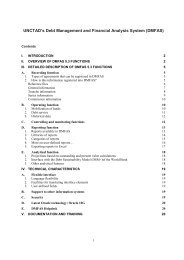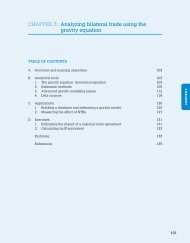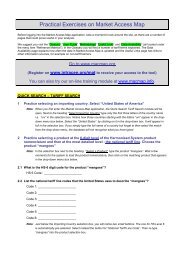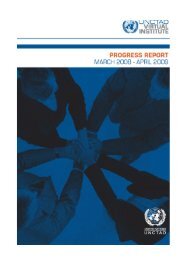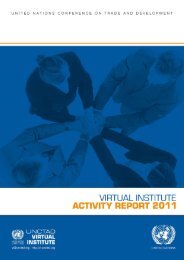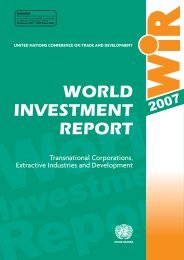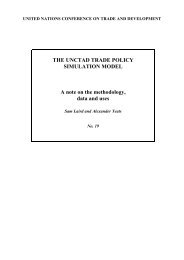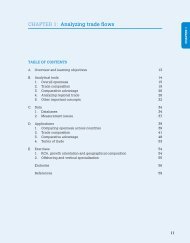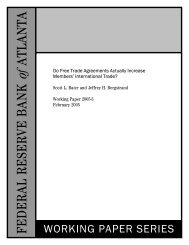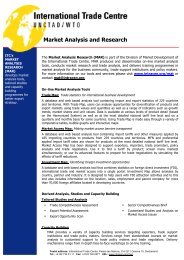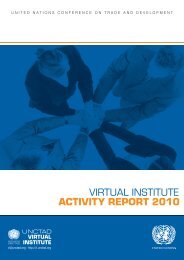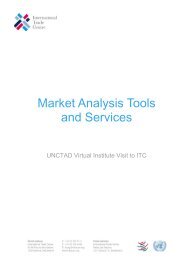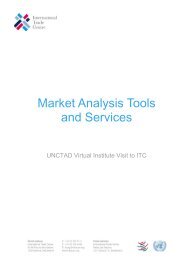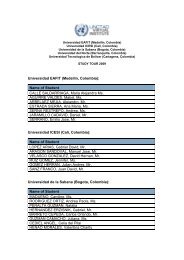Investment Policy Review - Rwanda - UNCTAD Virtual Institute
Investment Policy Review - Rwanda - UNCTAD Virtual Institute
Investment Policy Review - Rwanda - UNCTAD Virtual Institute
Create successful ePaper yourself
Turn your PDF publications into a flip-book with our unique Google optimized e-Paper software.
<strong>Investment</strong> <strong>Policy</strong> <strong>Review</strong> of <strong>Rwanda</strong><br />
locally or imported. Two rates were set in 2001: most goods and services are taxed at 15 per cent and<br />
exports are taxed at 0 per cent. A number of goods and services are also exempt. 27 The base rate was<br />
increased to 18 per cent in 2002, which helped raise VAT collection from 30.5 per cent of total revenue<br />
in 2001 to 34.8 per cent in 2004 (table II.2).<br />
Suppliers of taxable goods or services with annual turnover in excess of Rwf15 million ($26 000)<br />
must register, while other suppliers may do so on a voluntary basis. Investors seeking RIEPA incentives are<br />
also required to register for VAT purposes. Returns must be filed monthly on an accruals basis. Refunds<br />
can be claimed whenever input tax exceeds output tax without condition. The law stipulates that the<br />
RRA must refund excess payments within 30 days, or up to a maximum of 3 months if the claim must<br />
be investigated. Although the RRA frequently investigates claims, refunds appear to be effected efficiently<br />
and expeditiously. The RRA also faces a monthly penalty of 1.5 per cent in case of delays, which is the<br />
same penalty that investors face in case of late payments.<br />
No major changes are necessary to the VAT system or its administration. The authorities should<br />
nevertheless consider allowing companies to deduct VAT paid on imported services (“reverse charges”)<br />
as input VAT. At the moment, deductions are allowed only when services are “deemed not to be available<br />
in the local market”, i.e. when there is no single firm producing similar services locally. This definition<br />
is far too restrictive, as services may not be available in sufficient quantity and at the appropriate level<br />
of quality. Optimally, all VAT charges paid on services imports should qualify for deduction as input VAT<br />
when the service is used for business purposes.<br />
Table II.2. RRA, structure of revenue collection<br />
(Percentage of total revenue)<br />
2000 2001 2002 2003 2004<br />
Direct taxes 28.0 30.4 32.2 30.7 28.3<br />
Corporate taxes 15.4 18.2 18.1 13.7 11.5<br />
Personal taxes & others 12.6 12.2 14.1 17.0 16.8<br />
Taxes on goods and services 54.1 51.8 50.4 50.1 52.2<br />
VAT 1 21.2 30.5 31.9 33.3 34.8<br />
Excise & others 32.9 21.3 18.4 16.8 17.4<br />
Taxes on international trade 17.9 17.8 17.4 19.2 19.5<br />
1<br />
Turnover tax prior to 2001.<br />
Source: <strong>Rwanda</strong> Revenue Authority.<br />
b. Corporate and personal income tax<br />
The corporate and personal income tax code was overhauled in 1997 under Law 8/97 and was<br />
further reformed at the end of 2005 (Law 16/2005). Although the reforms have improved the structure,<br />
administration and efficiency of the tax system, the code still suffers from a number of weaknesses.<br />
27<br />
These goods include: health care, educational services, transport services, books, agricultural inputs, ICT goods and certain goods imported under<br />
RIEPA certification.<br />
35


